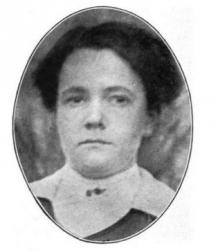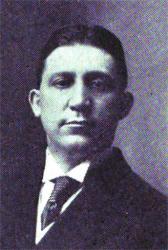Planning worship?
Check out our sister site, ZeteoSearch.org,
for 20+ additional resources related to your search.
- |
User Links
Person Results
‹ Return to hymnal



Export as CSV
Walter T. Smith
Person Name: W. T. Smith Hymnal Number: 21 Composer of "[The judgment day]" in Glad News
Walter T. Smith
Timothy Swan
1758 - 1842 Person Name: Swan Hymnal Number: 7 Composer of "[I would not live alway, I ask not to stay]" in Glad News Timothy Swan, 1758-1842, hymntune composer
Timothy Swan
Jeremiah Ingalls
1764 - 1838 Hymnal Number: 76 Composer of "[Amazing grace, how sweet the sound]" in Glad News Jeremiah Ingalls USA 1764-1838. Born at Andover, MA, his father died of hardships from the American Revolutionary War when he was thirteen. In VT, he worked as a farmer, Cooper, Taverner, and choirmaster. He mastered the bass viol (similar to a cello) and became a composer. He moved to Newbury, VT, in 1787, and in 1791 he married Mary (Polly) Bigelow of Westminster, MA, and they had eleven children (nine living to adulthood): Smith, Jeremiah, Joshua, Jeremiah, Mary, Moses, Elizabeth, John, Almyra, Isaac, and Hannah. He taught singing and began leading the singing at the First Congregational Church there. The choir became well-known, and people came from miles around to hear them sing. In 1800 he built and operated a tavern. He also worked as a cooper. In 1803 he became a deacon, and in 1805 he published a song book, “Christian Harmony”, that contained folk and popular songs with tunes used in spiritual songs sung in early religious revivals and campmeetings, some becoming hymns in later song books. It was said that at times he would be so immersed in his music that his livelihood suffered as a result. He was removed and excommunicated from his church in 1810, having a falling out with the church due to marriage infidelity that he refused to repent of. He ran his tavern for a number of years, but finally sold it and moved to Rochester, VT, in 1819, where he became the first choirmaster of the Church of Christ. His tenure there was successful, and he was a signer of the document establishing construction of the first church building in Rochester (1812). Later, his son, John, succeeded him as choirmaster there. the family’s last move was to a farm near Hancock, VT. He was described as short, portly, good-humored, and absentminded, and having a high voice, but singing bass well. His family was musical, some noted for their musical abilities. A singing society in VT was named for him and promoted singing events. Some of his music became well-known around the world. He died at Hancock, VT.
Note: It is said that he wrote a letter to the First Congregational Church in Westminster 18 years after departing repenting of his infidelity (allegedly after his illegitimate son, Thomas, was of age, but the letter was lost in church records, although the church said they had received it.
John Perry
Jeremiah Ingalls
Katharyn Bacon

1884 - 1944 Hymnal Number: 82 Author of "I've Tried to Do My Best" in Glad News Katharyn Bacon was born in 1884 and lived in the hills of Tennessee. She liked books, flowers, garden and being close to nature. She was most likely married to George W. Bacon since a lot of her hymns appear in hymnals he edited.
Dianne Shapiro, from "The Singers and Their Songs: sketches of living gospel hymn writers" by Charles Hutchinson Gabriel (Chicago: The Rodeheaver Company, 1916)
Katharyn Bacon
George W. Bacon
Person Name: Geo. W. Bacon Hymnal Number: 82 Composer of "[Thro' all the long and lonely years]" in Glad News Early 20th Century
George W. Bacon
Benjamin Beddome
1717 - 1795 Hymnal Number: 48 Author of "Lottie" in Glad News Benjamin Beddome was born at Henley-in Arden, Warwickshire, January 23, 1717. His father was a Baptist minister. He studied at various places, and began preaching in 1740. He was pastor of a Baptist society at Bourton-on-the-Water, Gloucestershire, until his death in 1795. In 1770, he received the degree of M.A. from the Baptist College in Providence, Rhode Island. He published several discourses and hymns. "His hymns, to the number of 830, were published in 1818, with a recommendation from Robert Hall." Montgomery speaks of him as a "writer worthy of honour both for the quantity and the quality of his hymns."
--Annotations of the Hymnal, Charles Hutchins, M.A. 1872.
=========================
Beddome, Benjamin , M.A. This prolific hymnwriter was born at Henley-in-Arden, Warwickshire, Jan. 23, 1717, where his father, the Rev. John Beddome, was atthat time Baptist Minister. He was apprenticed to a surgeon in Bristol, but removing to London, he joined, in 1739, the Baptist church in Prescott St. At the call of this church he devoted himself to the work of the Christian ministry, and in 1740 began to preach at Bourton-on-the-Water, in Gloucestershire. Declining invitations to remove to London or elsewhere, he continued pastor at Bourton until his death, on Sep. 3, 1795, at the age of 78. Mr. Beddome was for many years one of the most respected Baptist ministers in the West of England. He was a man of some literary culture. In 1770 he received the degree of M.A. from Providence College, Rhode Island. He was the author of an Exposition of the Baptist Catechism, 1752, in great repute at the time, and reprinted by Dr. C. Evans in 1772. It was his practice to prepare a hymn every week to be sung after his Sunday morning sermon. Though not originally intended for publication, he allowed thirteen of these to appear in the Bristol Baptist Collection of Ash & Evans (1769), and thirty-six in Dr. Rippon's Baptist Selection (1787), whence a number of them found their way into the General Baptist Hymn Book of 1793 and other collections. In 1817, a posthumous collection of his hymns was published, containing 830 pieces, with an introduction by the Rev. Robert Hall, and entitled "Hymns adapted to Public Worship or Family Devotion, now first published from the Manuscripts of the late Rev. B. Beddome, M.A."
Preface dated "Leicester, Nov. 10, 1817." Some of the early copies bear the same date on the title page. Copies bearing both the 1817 and 1818 dates are in the British Museum. The date usually given is 1818. Some hymns are also appended to his Sermons, seven volumes of which were published l805—1819; and over twenty are given in the Baptist Register of various dates.
Beddome's hymns were commended by Montgomery as embodying one central idea, "always important, often striking, and sometimes ingeniously brought out." Robert Hall's opinion is just, when in his "Recommendatory Preface" to the Hymns, &c, he says, p. vii.:—
"The man of taste will be gratified with the beauty and original turns of thought which many of them ex¬hibit, while the experimental Christian will often perceive the most secret movements of his soul strikingly delineated, and sentiments pourtrayed which will find their echo in every heart."
With the exception of a few composed for Baptisms and other special occasions, their present use in Great Britain is limited, but in America somewhat extensive. One of the best is the Ordination Hymn, "Father of Mercies, bow Thine ear." Another favourite is “ My times of sorrow and of joy," composed, by a singular coincidence, to be sung on Sunday, Jan. 14, 1778, the day on which his son died, most unexpectedly, in Edinburgh. "Let party names no more," is very popular both in Great Brit, and America. "Faith, His a precious gift," "Witness, ye men and angels, now," and the hymn for Holy Baptism, "Buried beneath the yielding wave," are also found in many collections. Beddome's popularity is, however, now mainly in America.
[Rev. W. R. Stevenson, M.A.]
Beddome is thus seen to be in common use to the extent of about 100 hymns. In this respect he exceeds every other Baptist hymnwriter; Miss Steele ranking second.
The authorities for Beddome's hymns are: (1) A Collection of Hymns adapted to Public Worship, Bristol, W. Pine, 1769, the Collection of Ash & Evans; (2) Dr. Rippon's Selections 1787, and later editions; (3) Sermons printed from the Manuscripts of the late Rev. Benjamin Beddome, M.A.,... with brief Memoir of the Author, Dunstable & Lond., 1805-1819; (4) Dr. Rippon's Baptist Register, 1795, &c.; (5) The Beddome Manuscripts, in the Baptist College, Bristol; (6) and Hymns adapted to Public Worship, or Family Devotion now first published, from Manuscripts of the late Rev. B. Beddome, A.M. With a Recommendatory Preface by the Rev. R. Hall, A.M. Lond., 1817. In his Preface, Mr. Hall gives this account of the Beddome Manuscript:— "The present Editor was entrusted several years ago with the MSS, both in prose and verse, with permission from the late Messrs. S. & B. Beddome, sons of the Author, to publish such parts of them as he might deem proper. He is also indebted to a descendant of the Rev. W. Christian, formerly pastor of the Baptist Church at Sheepshead, Leicestershire, for some of the Author's valuable hymns, which had been carefully preserved in the family. From both these sources, as well as others of less consequence, the present interesting volume has been derived."
-- Excerpts from John Julian, Dictionary of Hymnology (1907)
=======================
Beddome, Benjamin, pp. 121-124. Other hymns in common use:—
1. Great God, before Thy mercy-seat. (1817). Lent.
2. Great God, oppressed with grief and fear. (1787.) Reading H. Scripture.
3. How glorious is Thy word, 0 God. Holy Scripture. From "When Israel, &c," p. 124, i.
4. In God I ever will rejoice. Morning. From his Hymns, &c, 1817.
5. Jesus, my Lord, divinely fair. (1817.) Jesus the King of Saints. Begins with stanza ii. of “Listen, ye mortals, while I sing."
6. Rejoice, for Christ the Saviour reigns. Missions. Altered form of "Shout, for the blessed, &c," p. 123, ii.
7. Satan, the world, and sin. (1817.) In Temptation.
8. Thou, Lord of all above. (1817.) Lent.
9. Unto Thine altar, Lord. (1787.) Lent.
10. Ye saints of every rank, with joy. (1800.) Public Worship.
The dates given above are, 1787 and 1800, Rippon's Selection; and 1817 Beddome's Hymns.
--John Julian, Dictionary of Hymnology, Appendix, Part II
Benjamin Beddome
Everett Stevens
Hymnal Number: 28 Composer of "[Christ will hear your plea today, O sinner, will you seek his grace!]" in Glad News
Everett Stevens
Henry P. Morton

Hymnal Number: 73 Composer of "[Have you thought how far away]" in Glad News
Henry P. Morton
John Bacchus Dykes

1823 - 1876 Person Name: J. B. Dykes Hymnal Number: 159 Composer of "[Holy, holy, holy! Lord God Almighty!]" in Glad News As a young child John Bacchus Dykes (b. Kingston-upon-Hull' England, 1823; d. Ticehurst, Sussex, England, 1876) took violin and piano lessons. At the age of ten he became the organist of St. John's in Hull, where his grandfather was vicar. After receiving a classics degree from St. Catherine College, Cambridge, England, he was ordained in the Church of England in 1847. In 1849 he became the precentor and choir director at Durham Cathedral, where he introduced reforms in the choir by insisting on consistent attendance, increasing rehearsals, and initiating music festivals. He served the parish of St. Oswald in Durham from 1862 until the year of his death. To the chagrin of his bishop, Dykes favored the high church practices associated with the Oxford Movement (choir robes, incense, and the like). A number of his three hundred hymn tunes are still respected as durable examples of Victorian hymnody. Most of his tunes were first published in Chope's Congregational Hymn and Tune Book (1857) and in early editions of the famous British hymnal, Hymns Ancient and Modern.
Bert Polman
John Bacchus Dykes


 My Starred Hymns
My Starred Hymns


